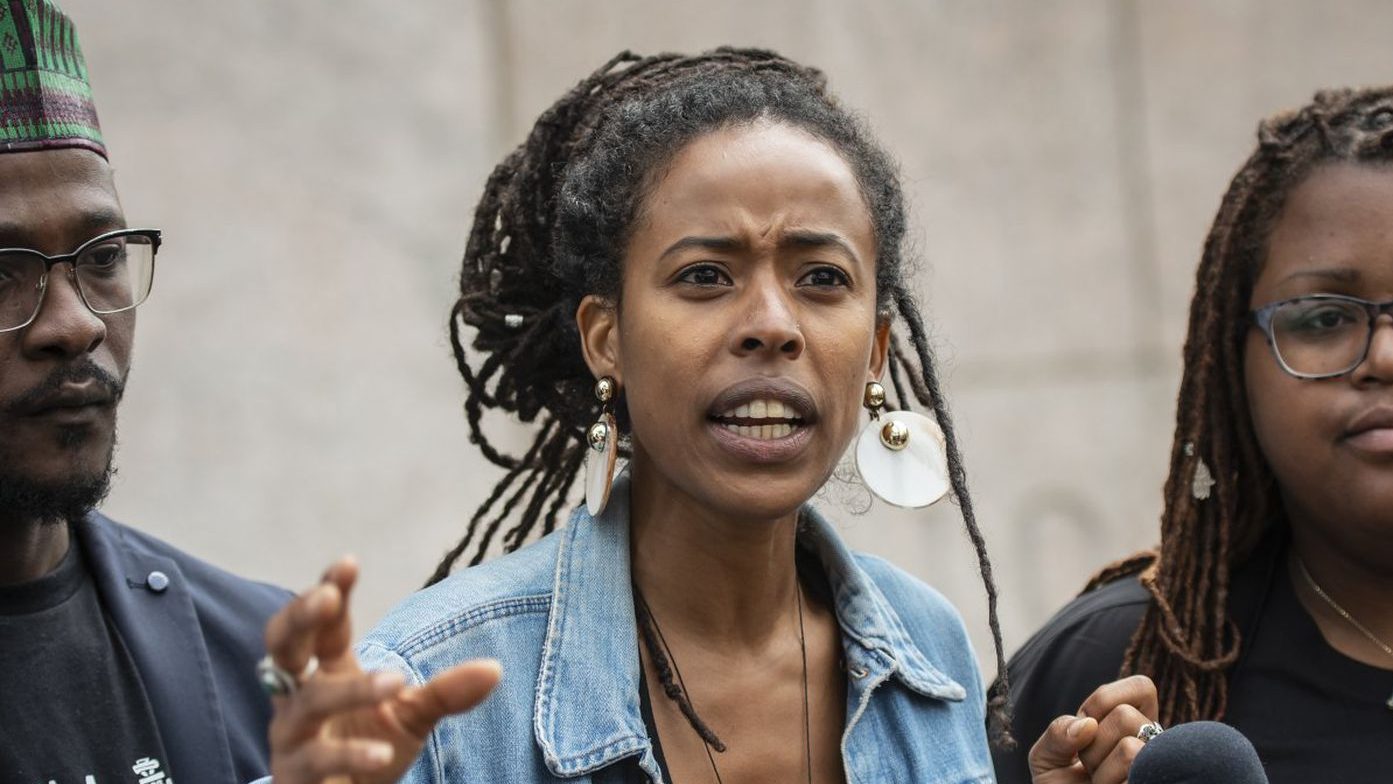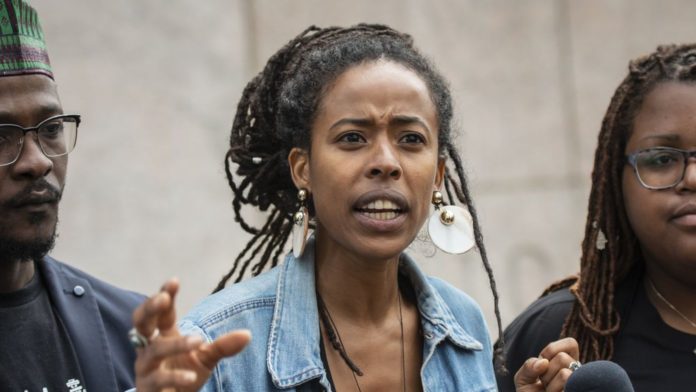[ad_1]
Donisha Prendergast, granddaughter of reggae legend Bob Marley, says she and her friends deserved more respect during their run-in with Rialto, CA police officers last month.
A neighbor called the police on Prendergast and her friends exiting an Airbnb they had rented for the weekend. They were putting luggage into a vehicle in the driveway. The neighbor claims she did not recognize the people and so smiled and waved at them, but got no response. She apparently found that suspicious and called 911 saying that there was a burglary in progress.
The women (three Black, one white), were questioned for approximately 20 minutes by several police officers who caught up with them as they were en route to their next destination. A helicopter had also been summoned, but was called off once officers assessed the situation. The women were eventually allowed to leave without charges.
READ MORE: Airbnb sends letter to mayor after white woman calls police on Black women
READ MORE: Outrage after firefighter who spit on Black child, used N-word, at Hooters found not guilty
Videos of Prendergast and her friends posted online showing the incident have gone viral causing many to voice an opinion online that this is yet another example of white people calling the police on Black people for no reason, thereby endangering Black people’s lives with unnecessary police encounters.
Attorney Benjamin Crump, who once represented Trayvon Martin’s family, has joined the legal team behind Prendergrast and her friends.
“The police can not detain Black people and presume that they are guilty just because of the color of their skin. Being black is not a crime. This isn’t South Africa apartheid times where they need paperwork or a permit proving they have a right to be where they are. This is apparently what happened when you view that video,” said Crump.
“When you listen to that 911 call, it has striking similarities to that call six years ago that Trayvon’s murderer’s call made calling Trayvon suspicious,” he continued. “It’s also worth noting that there were four people unloading their luggage that day—three Black and one white. Interesting that the 911 caller only said three Black people seemed suspicious. So, the white person was extended the white privilege exception.”
READ MORE: Yale says police ‘admonished’ the woman who called them to remove a napping Black grad student
In an interview with theGrio, Donisha Prendergast and Kelly Fyffe-Marshall (one of the women involved in the Airbnb incident) and their attorney Jasmine Rand share their side of the story as people in the center of the latest police incident to capture the nation’s attention.
The women talked about their fear in the moment, the grace of Bob Marley’s spirit, and why they consider this to be a teachable moment.
theGrio: What were your first thoughts when you saw the police cars and figured out that they were there for you?
Kelly Fyffe-Marshall: My first response was fear. I thought of Sandra Bland. I watched that story so closely because we’re the same age and I understood her thoughts. I saw myself as Sandra Bland, so when this happened, I thought of all the people before me who hadn’t made it out of the situation. When the police got of their cars and told us to put our hands up, that was my first thought.
Donisha Prendergast: We find the response from the police and their use of the words “respect” and “dignity” about the situation to be skewed. When they jumped out of the vehicle and shouted at us to put our hands up with their hands on their holsters unclipped and ready, I don’t think that’s a respectful way to engage anyone. We aren’t used to people speaking to us in that kind of disrespectful tone. We demanded of them that they treat us with the respect that is due to us.
theGrio: What prompted you to start filming the incident?
DP: We’re filmmakers so our first instinct is to document. Also, we know our camera can be used as a weapon of mass construction. In this instance, we prepared ourselves with what we had to preserve our lives.
My grandma was waiting on me when those policemen decided to interrupt my life with their stupid, irresponsible, expensive display of fear that escalated from one woman. For her to say that we didn’t smile and wave, that’s not cool because that’s not true. She didn’t smile or wave either. As a matter of fact, the energy that we perceived from her as she was standing across the way was uncomfortable. She didn’t want us there. Her hand was on her window and she was on her phone. So, if someone was really afraid of us, I think they would have been inside behind blinds, not outside on the lawn looking over at us.
theGrio: How do you respond to people who say you are blowing this out of proportion given that there were no guns drawn and you were not physically beaten?
Jasmine Rand: It’s kind of astounding to me that some members of the media and the general public would ask them to apologize for being alive and to apologize for not ending up like Michael Brown, for not ending up like Trayvon Martin, for not ending up face down bleeding in the ground. What we have to remember is that we are blessed that these people are alive so that we can hear their voices and so that I don’t have to be their voice from beyond the grave. Right now in this nation, the only time Black people have a voice is posthumously. Not only did they have a right to stand their ground that day, but they also have a responsibility to the other people who didn’t make it and to the other people in the future who are going to be in similar situations.
theGrio: There are reports that you plan to sue. Would you be suing the police department, the 911 caller, both?
JR: There’s a lot of misinformation out there. No lawsuit has been filed. What we’ve done so far is put them on notice of representation and asked that all the documents and evidence be transmitted to us and obviously ask them not to destroy any evidence. So, we’re going to review it to see the extent to which their constitutional rights were violated. From the video evidence we already have, it’s obvious to me that there were violations of their fourth amendment rights and violations of their 14th amendment rights under the equal protection clause and certainly they were falsely imprisoned.
We will see if we will proceed forward with litigation and in addition, we are looking for the Rialto Police Department to conduct an independent criminal investigation into the neighbor who placed the 911 call who initiated these false allegations against our clients. There’s a California statute that provides remedy for exactly this instance in which a person endangers another person’s life by placing a call making false allegations.
theGrio: Is there case law of this statute in action?
JR: There’s a statutory mechanism that has been enacted. I don’t know if there’s any precedent by case law, but Ben Crump and I are always happy to set new precedents.
theGrio: What has Airbnb’s response been to you in the wake of this incident?
DP: Airbnb has responded very positively. They messaged us to let us know that it is not just a corporate call, but that members within their community are very diverse and concerned about this incident and they are looking forward to finding balanced ways to move forward.
theGrio: Have you had any contact with the Airbnb owner since that day? She has since said that race had nothing to do with this situation and all you had to do was wave to the neighbor to avoid this.
JR: We can’t comment on communications with her at this time, but we can say that we find it appalling that the Rialto Police Department invited her to the press conference instead of inviting my clients and also offering them an apology. More concerning and more appalling is the fact that this woman stood beside the Rialto Police Department and they allowed her to send such an irresponsible message to the community that Black people must not only wave at white women at their behest, but they must also smile so as not to appear criminal and so as not to subject their lives to danger. Individuals need to start being held more accountable for their racism. And institutions need to be held more responsible for perpetuating systemically that same racism.
theGrio: Your grandfather Bob Marley’s music evokes thoughts of standing up for your rights, redemption, revolution, etc. He spoke of issues that still resonate today. Do you think society has changed much since he was alive?
DP: Yesterday marked 37 years since he passed. One of the last songs he released to the world was “Redemption Song” where he says “Emancipate yourselves from mental slavery/No one but ourselves can free our minds.” And still today I look around and I see how my brothers and sisters are in mental shackles from the trauma that is perpetuated by the entire system around them.
theGrio: What is your big takeaway from this experience?
DP: I just have to be really quiet right now to over-stand this position that the universe is putting us in as voices to speak on behalf of those who don’t have the voice to speak. I have to be humble to that reality. My grandfather was protecting us. His energy was surrounding us. By his grace we are here to speak.
At the center of every revolution is an evolution and before we can evolve, we have to learn to love ourselves from the inside out. These are lessons we want to teach because we too protect and serve our community, it’s just that we don’t use guns and power and protocol in order to do that. We’re hoping that in these moments, we can teach from each other and learn from each other and create new ways of co-existence.
[ad_2]
Source link


